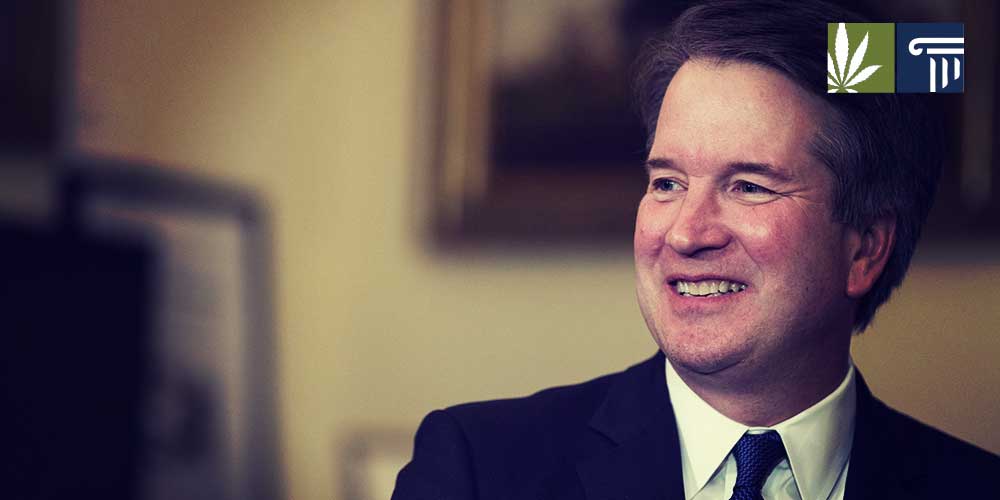On July 9, President Donald Trump nominated Brett M. Kavanaugh to replace Justice Anthony M. Kennedy, who has retired from the U.S. Supreme Court. At 53, Kavanaugh is relatively young and, if confirmed, may serve for decades. Where does he stand on marijuana?
D.C. Circuit Rulings
Kavanaugh has served as a judge on the U.S. Court of Appeals for the D.C. Circuit since 2006, and while that court has ruled on various appeals of criminal drug convictions, there does not appear to be a case in which Kavanaugh has written an opinion that addresses marijuana policy.
In 2013, however, the D.C. Circuit ruled against Americans for Safe Access (ASA) and for the DEA in a suit that challenged the DEA’s denial of a petition “to initiate proceedings to reschedule marijuana.” The court ruled that there were not enough “adequate and well-controlled studies” to justify rescheduling marijuana. As the attorney for the ASA put it in a press release: “To say that sufficient evidence is lacking on the medical efficacy of marijuana is to ignore a mountain of well-documented studies that conclude otherwise.”
Although Kavanaugh did not author the opinion of dissent in that case, the court’s deference to the DEA’s authority, even in light of available evidence of the medical value of marijuana, is telling.
Another area of law that offers a little insight into how Kavanaugh may rule on drug policy is the Fourth Amendment. Many drug convictions are contested on Fourth Amendment grounds, since the amendment prohibits “unreasonable searches and seizures,” and drug convictions often depend on whether the police had the right to perform the searches that resulted in a conviction. A liberal Supreme Court justice, Thurgood Marshall, said in 1987 that he would not even read a “dope case,” saying “I ain’t giving no break to no drug dealer.” Those who spend much time reading the published appeals of drug convictions are likely to conclude that federal judges as a whole are, like Marshall, very unlikely to rule against a search that finds illegal drugs. (One exception: Judges do not like being lied to, and they may rule against police who lie to a court about their reasons for a search.) In regard to Fourth Amendment cases about cops and drug dealers, Kavanaugh’s rulings are unexceptional, and they offer no insight into what views he may have on marijuana policy.
The Fourth Amendment goes beyond cops and drug dealers, however. Workplace drug testing is an example. On the SCOTUSblog, a widely respected blog on the Supreme Court, a post written by Orin Kerr assesses a Kavanaugh opinion on workplace drug testing. Kerr writes: “In tough Fourth Amendment cases that divide the Supreme Court, a Justice Kavanaugh would likely be on the government’s side.” In National Federation of Federal Employees v. Vilsack, Kavanaugh wrote in support of the government’s claim that public safety concerns justified random drug testing of “Forest Service Job Corps Center employees.”
Kavanaugh’s record of deference to government authority extends to the FDA as well. In Abigail Alliance for Better Access to Developmental Drugs v. von Eschenbach, he wrote in favor of the FDA, which denied “terminally ill patients a right of access to experimental drugs that have passed limited safety trials but have not been proven safe and effective.” While this ruling may be read as an indication that Kavanaugh would be unwilling to rule in favor of expanding legal access to cannabis medicines, two recent political developments should be considered. One is that President Trump recently signed a “right to try” bill into law. The new law specifically allows patients who have nothing to lose to try medications and treatments that have not been approved by the FDA. With the “right to try” law in place, federal courts may be more open to allowing people to try cannabis medications. Another development is that recently the FDA approved a CBD drug for certain types of epilepsy.
Kavanaugh’s views on marijuana policy have not been made explicit, but he is the nominee of a conservative president, and his judicial record shows deference to federal government authority. While it seems unlikely that, once on the Supreme Court, he would rule against the federal government on a marijuana case, the federal government itself has recently changed its marijuana policy slightly in the direction of tolerance.
One big question remains: How would Kavanaugh rule in a case that pits a legal state, such as Colorado or California, against the federal government? Given his record, it would seem more likely he would rule in favor of the federal government.
What do you think? If Kavanaugh is confirmed, how will he rule on marijuana laws? Leave a comment below.






